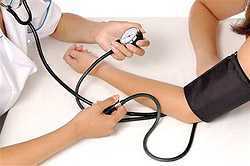Blood pressure refers to blood pressure. High blood pressure is called hypertension.High blood pressure (hypertension), observed in one out of every 7 people, is defined as a condition in which the blood pressure is constantly above 140/90 mmHg (14/9). High blood pressure leads to complaints such as headache (usually in the neck), sometimes dizziness, palpitations, rapid fatigue.In order to get the blood to the farthest points of the body, the heart has to pump the blood with a certain pressure. Blood carries oxygen and nutrients that are necessary for our organs. Therefore, a certain blood pressure must be maintained in order for circulation to continue.Systolic or high blood pressure, strong pressure that occurs when the heart contracts, the heart relaxes
the pressure that occurs in the queue is called diastolic or small blood pressure. The blood pressure value considered normal is 120/80 mmHg (millimeters of mercury) in an adult at rest. In other words, the normal value for high blood pressure is 12, and for small blood pressure it is 8.In fact, blood pressure is not a value that remains constantly constant. It may increase slightly when moving or getting excited, it may be lower when sleeping and resting. These changes are normal. However, if the blood pressure is constantly above 140/90 mmHg (14/9), high blood pressure is mentioned.
What is the Incidence of Hypertension?
Hypertension is a common disease. According to the results of a study conducted by the Society of Cardiology, it is estimated that about 15 million people in our country have hypertension.
Why Does Blood Pressure Rise?
90% of patients?the cause of hypertension cannot be determined; in this case, primary or essential hypertension is mentioned. In the remaining 10% group, there is a reason and `secondary? it is called hypertension. Among these, kidney Decongestant causes are the most common.
What is the Harm of Hypertension to the Body?
Although it may not cause symptoms, high blood pressure can lead to complaints such as headache (usually in the neck), sometimes dizziness, palpitations, rapid fatigue. Especially if you have no complaints, the only way to find out that you have high blood pressure is to have your blood pressure measured. ?Why should I take medication when I have no complaints? if you think so, you should remember that hypertension can have very serious consequences! Whether it gives symptoms or not, untreated hypertension increases the risk of having a heart attack or stroke and can lead to the development of heart or kidney failure. However, it is possible to treat hypertension and prevent it from leading to these scary diseases. Two important points that you should pay attention to when applying treatment and precautions are that you should strictly adhere to the recommendations of your doctor and know that you should continue treatment for life.

